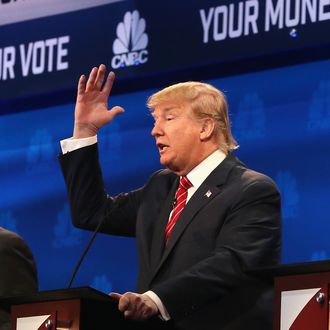
A few days after the CNBC presidential debate — which the GOP campaigns called “horrendous,” “stupid,” and “ridiculous” — the Republican National Committee has decided to suspend its plans to let NBC News host a debate on February 26.
“The CNBC network is one of your media properties, and its handling of the debate was conducted in bad faith,” RNC chair Reince Priebus wrote in a letter to NBC and Telemundo. “We understand that NBC does not exercise full editorial control over CNBC’s journalistic approach. However, the network is an arm of your organization, and we need to ensure there is not a repeat performance.” National Review was scheduled to co-host the debate; the RNC plans on continuing to work with the conservative magazine. NBC released a statement saying it would “work in good faith to resolve this matter with the Republican Party.”
Priebus also noted that the “moderators engaged in a series of ‘gotcha’ questions, petty and mean-spirited in tone, and designed to embarrass our candidates. What took place Wednesday night was not an attempt to give the American people a greater understanding of our candidates’ policies and ideas.”
He did not add that the American people would have also gained a fuller portrait of the candidates’ ideas if they had not evaded, ignored, or lied in response to many of the actual policy questions they were asked, and he didn’t note that the idea that a “gotcha” question includes the entire universe of queries that could point out the weaknesses of a campaign is a disputed one. He also did not explain whether the fact that his party’s candidates were not able to correctly answer the first question of the debate — What is your biggest weakness? — disqualified them from being able to complain about debate etiquette.
The RNC might not have had a choice in sacrificing NBC at the altar of Saint Sweaty Nixon, the god of all those embarrassed by unexpected debate inquisitions and aftermaths. The Republican presidential candidates were supposed to meet this weekend to discuss their future debate plans — and the RNC wasn’t invited, according to Politico. As Mike Huckabee — who didn’t get a chance to speak much at the debate warned — on Thursday, “The campaigns are not going to allow the networks to control this process.”
This isn’t the first time a party has broken up with a network before a debate; in 2007, the Nevada Democratic Party canceled a Fox News presidential debate after Roger Ailes made a joke about Obama and Osama bin Laden. The New York Times wrote at the time,
Of course, the campaign season is still in its early phases, and there are reports of discussions between Fox News and other organizations to sponsor Democratic debates.
Also, some noted, conservatives can play the same game. At a blog sponsored by The National Review, a conservative magazine, the site’s editor posted this comment: “If this becomes a tool of the blogosphere — calling for boycotts — the right will be making noise about an MSNBC/CNN debate any day now.”
This is also not the first time that candidates have complained about moderators asking questions they’d rather not have to answer. When candidates feel like they did lousy, it’s much easier to blame the media than yourself — and given the general public’s feelings on the press, it’s usually the easiest, “Hey, look over there!” con to get away with.
Donald Trump, who noted before the CNBC debate even began that he thought it would be unfair, also complained about the last two debates. After the CNN debate, several campaign managers talked to Politico about how few substantive policy questions they got to answer. Right in the middle of the CNBC debate, Ted Cruz complained that the Democratic debate moderators were, in turn, too easy.
Ben Carson and Donald Trump, neither of whom have much policy experience, have bugged networks about having more time to give opening statements — or, rather, a chance to regurgitate the same positive promises to make everything great and beautiful without explaining the places where reality might limit their ambition. Helping voters learn where campaign promises don’t make sense or how a candidate could fail is one of the responsibilities for a moderator — and since candidates have no interest in revealing these things, it leaves both at an impasse, complaining about each other until the end of time.
Even when candidates start to drop out at a quicker pace — getting rid of the complaints about speaking time and holding a separate forum for those low in the polls — candidates still aren’t going to like answering hard questions or ones that don’t make them look good, despite desperately wanting a job where they will have to answer a ridiculous number of difficult questions on a daily basis, and breaking up with certain news organizations isn’t going to make them go away.





























